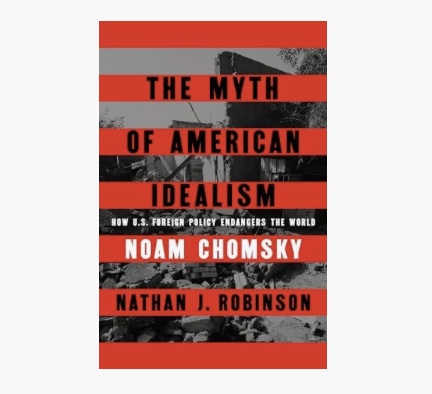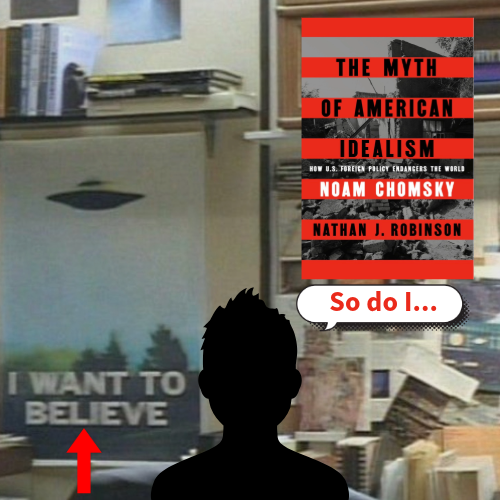Beliefs can be a tricky thing. Whenever I want to believe in something, I’m reminded of that famous poster from The X-Files in Fox Mulder’s office—a UFO image overlaid with the words “I want to believe.” It’s a constant reminder that our default human setting is “to believe,” which means I must often consciously adjust my preference to “not believe.” Yet, the struggle is real. Reading The Myth of American Idealism by Noam Chomsky and Nathan J. Robinson (2024) forced me to revert to my natural setting more than once—I want to believe that our foreign policy reflects our cherished ideals. Sadly, this is not the case.
Book Review
The lengths America will go to retain hegemonic power seem endless. The sheer volume of details, examples, and citations alone could fill a week-long seminar. For now, I will highlight a few strong points. For example, our foreign policy is framed by the notion that we are ‘fully entitled to do [whatever we choose] indefinitely’ (Chomsky & Robinson, 2024). This sense of entitlement guarantees our continued supremacy and hegemony in the world order. Moreover, our foreign policy mirrors our founding fathers’ belief system that is ingrained in the very bones of our Constitution—one that upholds a capitalist system where the national interest of the elite takes precedence over that of the people. The business class—the very group James Madison referred to as “the more capable sort of men” (p. 243)—steers our course, believing that stability is achieved through the economic and strategic influence wielded by those in power. This observation made me question the function of capitalism—a system I support—but it also reinforced my conviction that government regulation is necessary to counterbalance our inherent tendency toward self-interest.

The Myth of American Idealism: How U.S. Foreign Policy Endangers the World
I was shocked to discover how often U.S. interests align with foreign dictators rather than with democratically elected leaders. Is it not ironic that our foreign policy routinely reinforces dictatorship and totalitarian regimes instead of democracy? As the book notes,
“… the United States has never cared about liberating people from tyrannies, and in fact strongly supports friendly tyrannies” (p. 126).
You might argue, “That’s because those democratically elected governments were communists or socialists.” To that I say:
1. They were democratically elected nonetheless, and citizens have the right to self-determination—a right that should be respected; and
2. Our interference isn’t for their benefit but rather a deliberate effort to prevent a state with an alternative form of government from setting a positive example.
Imagine if an alternative government succeeded in prioritizing the distribution of resources to its people first. Such a model would directly challenge the current structure of power. In American capitalism, profits are prioritized for businesses before they “trickle down” to the people. It is far easier to control individual interests than to manage the collective will of an entire population.
We recently reviewed Jesus and John Wayne by Kristin Kobes Du Mez (2020), get your copy here. In her book, she argues that the militant Christian masculinity epitomized by characters like John Wayne is deeply embedded in both our military and our broader culture. I was elated when I read the following quotation:
“Vietnam Veteran W.D. Ehrhart, who joined the antiwar movement on returning to the United States, says that the experience of war fundamentally changed his view of the U.S. role in the world. As a child, ‘I lived on a diet of John Wayne movies and Audie Murphy movies,’ and in Vietnam” (p. 83).
In my view, Dr. Du Mez hit the nail on the head (read review here).
Foreign Policy Events
A major point to note: Although many—especially in my generation—we tend to associate warfare exclusively with the Republican Party, the truth is that these interests and tactics cross party lines. It seems the one bipartisan action that always passes is a military intervention when U.S. investments are at stake. No party is innocent. Consider the following evidence that demonstrates the U.S. disregard for international law:
– “The US provided logistical support, intelligence support, and over $500 million worth of equipment for Hussein’s blatantly illegal war” (p. 110).
– The invasion of Panama in 1989.
– The embargo against Cuba.
– US support for the Nicaraguan Contras.
– The use of cluster munitions (e.g., in Serbia, Vietnam, and Afghanistan).
– Carpet bombing in Vietnam.
– The detention facility at Guantanamo Bay.
– The Vietnam and Iraq wars.
– Obama’s attack on Libya.
– The CIA murder of General Rene Schneider.
– From 1948 through the 1970s, “the CIA funneled over $65 million to approved parties and affiliates” (p. 27).
– Support for regimes that use torture (Egypt, Turkey, and Iraq).
– Various treaties left unratified by the U.S., including:
(a) The Convention on the Elimination of All Forms of Discrimination Against Women
(b) The Convention on the Rights of the Child
(c) The International Convention for the Protection of All Persons from Enforced Disappearance
(d) The Anti-Personnel Mine Ban Convention
(e) The Convention on the Rights of Persons with Disabilities
(f) The Kyoto Protocol
(g) The U.S. did join the Genocide Convention—with the caveat that “the US was exempt from being accused of genocide”(p. 255).
– The bombings of Hiroshima and Nagasaki.
– North Korean bombing incidents between 1951 and 1952.
– The CIA-led coup of Minister Mohammad Mossadegh.
– Nixon’s crimes in Indochina.
– And the list continues…
Given these actions, I ask you: Do they reflect your American ideals? Our persistent disregard for our own international peace commitments indicates that international law is, in reality, dictated by those in power.
Part II of the book is critically important, as it delves into elitism, aristocracy, and the manufacturing of consent within the public sphere—that is, how consent is engineered even when it runs contrary to the public’s best interests. Although I would like to explore these topics in greater depth, I feel it is necessary first to understand the manufacturing of dissent and the widening wealth gap. Ultimately, we must ask: Where is the responsibility for those granting consent? At what point does personal responsibility come into play? This is a critical question in today’s age of misinformation.

I was also pleased to see that the book addresses “climate change” and the broader climate crisis. Chomsky and Robinson note that in November 2019, over 11,000 scientists from 153 countries warned that Earth is facing a “climate emergency” (Chomsky & Robinson, 2024, p. 221). See full IPCC 2023 Climate Change report here for an update. This discussion is more important than ever, given recent policy changes under President Donald Trump—removing green incentives, withdrawing from the Paris Agreement, and incentivizing fossil fuel dependence. I encourage readers to shift focus away from debating whether climate change exists; instead, let’s focus on the rate at which it is occurring. Chomsky and Robinson suggest that the primary contributors to this crisis are “Carbon Colonials”—those who benefit from the current fossil-fueled model. In the West, rising temperatures may, at least temporarily, boost productivity and comfort, whereas poorer countries near the equator suffer far more.
One particular point in the book resonated with my education in Communication:
“Wars are sanitized. As Adam Smith pointed out, they can even become a kind of ‘amusement’ for those who live far from the battlefield and only encounter conflicts as abstractions or collections of statistics. For those who inhabit ‘great empires,’ Smith said, ‘reading in the newspapers the exploits of their own fleets and armies’ is exciting, and peace can even be disappointing, because it ‘puts an end to their amusement, and to a thousand visionary hopes of conquest and national glory from a longer continuance of the war'” (p. 12).
Did you take that all in? It immediately brought to mind the concept of parasocial relationships—like those between viewers and streamers who share in the thrill of a player’s success. These shared emotions and mutual congratulations mirror how we relate to our warriors on the battlefield. It’s a thought-provoking analogy that should make you question why we consume the content we do. I firmly believe that our media diet shapes many of our beliefs—we are what we consume, both as individuals and as a nation.
Favorite Quotes
– “Totalitarians wish us to think that a country speaks with one voice, that it has a ‘national interest'” (Chomsky & Robinson, 2024, p. 8).
– “The first beneficiaries of a country’s resources must be U.S. investors and their local associates, not ‘the people of that country'” (p. 11).
– “Abstraction and euphemism also protect us from having to look into the eyes of the victims. They are removed from our consciousness. They do not speak” (p. 12).
– “Because votes cannot be obtained on the platform of helping the rich get richer, the party [Republican] uses its extremist positions on ‘cultural’ issues as a battering ram in the neoliberal assault on the population” (p. 241).
– “When elephants fight, it is the grass that suffers.”
– “Once again, if the people of the US knew what was being done by their ‘democratic’ government, they wouldn’t like it,therefore they must not be told” (p. 165).
– “If something is in the public’s interest, but not in the interests of the corporate sector, they will fight to prevent the problem from being solved” (p. 227).
– “Once we see that the [American] ideals are applied selectively, we can ask what governs the choice to apply or not to apply them in particular cases. As a general rule, the United States opposes the criminality and violence of those powers we wish to contain and supports the criminality and violence of our valued partners and allies” (p. 227).
Closing thoughts
I found a chapter dedicated to U.S., Palestinian, and Israeli relations rather thin. Its brevity leaves little room for the in-depth discussion that such a complex topic deserves. The arguments presented might be accepted uncritically for readers unfamiliar with alternative viewpoints.
What I find most unsettling, however, is that U.S. foreign policy often aligns with the interests of totalitarian regimes. We pride ourselves on our belief in self-determination; yet, when a democratically elected government challenges our interests, we strip that government of its self-determination and enforce our will with a stick—out of fear that a positive alternative might emerge. Perhaps it is time to set a new example, one that prioritizes incentives (the “carrot”) for both our people and our foreign allies.

The Myth of American Idealism: How U.S. Foreign Policy Endangers the World
If you are interested in these topics, you can purchase a copy of the book here. I am an Amazon associate. Your purchase via. The link helps promote my work at no cost to you. Join the discussion and check out our current reading list here!
Future Reading: David Hume and Bertrand Russell
Thank you for your support and let’s continue to MAKE READING GREAT AGAIN!
Follow us! 🌐 ToSpeakOnline.com | 📺 YouTube Channel | 🎙️ Spotify Podcast | ✉️ Newsletters | TikTok | Instagram | Twitter/X | Facebook | LinkedIn | Partners & Associations
Written by: Charles L Randolph



